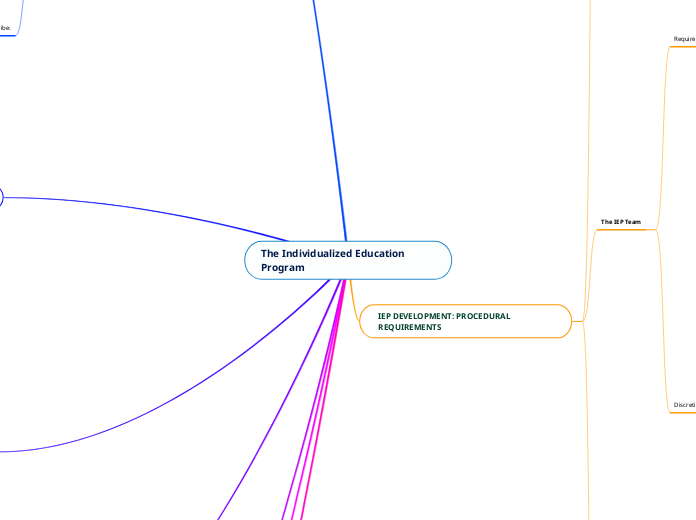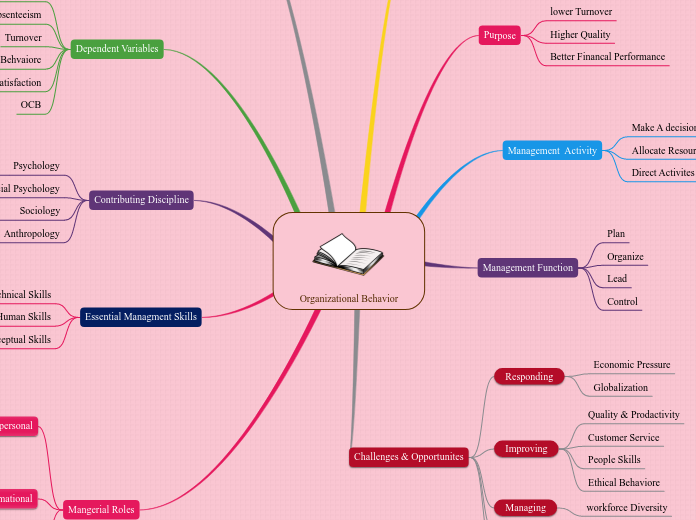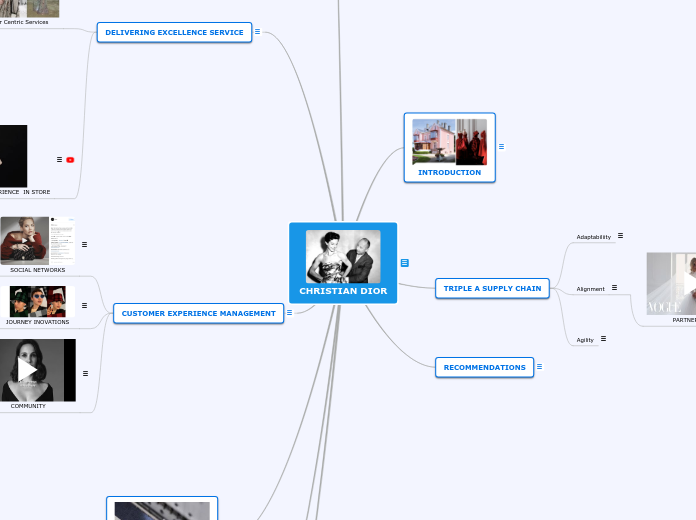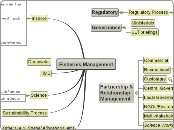The Individualized Education Program
Lessons from Litigation and Legislation
Principle 5: Ensure that all teachers and related service providers understand their responsibilities as listed in a student's IEP
This is very important. During my practicum last semester, I was working together with my mentor teacher to provide services to one of the students in first grade. And something that it stuck with me was that my mentor teacher had a very good relationship with the general education teacher to see how the students were progressing and if the students were regressing, they would discuss how to help him out. That is something that I would like to do in the future because I saw that even though the student was struggling because of their behavior, they still found multiple ways to help the student to not regress. Teamwork!
Principle 4: Develop an IEP that will enable a student to make progress
Principle 3: Assemble are appropriate IEP team
Principle 2: Involve a student's parents in the development of his or her IEP
Principle 1: Ensure the procedural requirements of the IDEA are followed
Section 504 and the IEP
A student who does not qualify under the IDEA, or who no longer qualifies, might meet eligibility criteria for services under Section 504
They allow a school district to use an IEP to fulfill the law's requirements, although this is only one method of meeting those requirements
It does not require the preparation of an IEP for students protected under the law
Standards-Based IEPs
The student's special education and related services, supplementary services, and a program modifications would be designed to help the student make progress toward his or her grade-level standard.
It is very important that educators understand what a standards-based IEP is not.
The expectation that a student's IEP be aligned with a state standard does not mean that the IEP can only include appropriate grade-level standards and related grades-level curriculum.
It is not a restatement of the state content standards nor is it an IEP in which a student's goals are taken from the state standards.
Reviewing and Revising the IEP
Placement in Private Schools
The school district should hold an IEP meeting that includes a representative of the private agency.
The school district may allow the private facility to conduct annual reviews, but the district retains responsibility for ensuring that the parents and a representative of the home school district and agree to any changes in the IEP.
Communicating the Requirements of the IEP and Implementing the IEP
Failing to implement an IEP as written is a significant error that certainly may constitute a denial of a student's FAPE, those are violations of the IDEA.
IDEA require that the school district officials ensure that every student's IEP is accessible to a:
any other service provider
related service provider
special education teacher
regular education teacher
IEP DEVELOPMENT: SUBSTANTIVE REQUIREMENTS
Parental Participation
If no agreement is reached, the last a fundamental issue, such a placement, the school should reming the parents of their right to call a due process hearing and attempt to develop an interim educational program.
The school should provide:
detailed records of visits made to the parents' home and place of employment, and results of those visits
I think that the parent should be very involved with the student's education progress, but to do that the parents with the school have to build a strong communicative relationship where they both can make progress together towards the student's needs. For example, as I was reading this week's chapter 10 I noticed that in most of the cases, like Rowley and Endrew, made the mistake of not having a lack of communication with the parents which lead them to proceed without the parent's consent. I believe that as long as the parents and the school personnel can have frequent phone calls or even text messages during school and after even during summer about the student's needs, that will help more than 100% of how to progress.
copies of correspondence and any responses received
detailed records of telephone calls made or attempted
When the parents cannot be located, surrogate parents must be appointed to represent the interests of the student.
They must be:
collaborate on the development of the IEP
equal participants in the IEP process
The IEP mandate
This process:
Related services to be provided to an eligible students
Written document delineating the special education
An IEP team develops an appropriate program
Is a written statement for a student with a disability that is developed, reviewed, and revised with the requirements of the IDEA.
Schools cannot use standard IEPs, nor can IEPs be based on available services.
Is the foundation of a student's FAPE,
it must be:
developed to meet the unique needs of a student
individualized
Is created in a planning process in which school personnel and parents work together to develop of special education and related services that will result in meaningful education benefit for the student for whom it is developed.
Purposes of the IEP
Evaluation
IEP must describe:
include a schedule for reporting on a student's progress toward his or her goals.
how a student's annual goals will be measured
Annual goals in the document are measured using the criteria listed in the IEP to determine the extent of the student's progress:
The appropriate school personnel must that the goals will be measured.
The IEP must contain goals that are measurable.
To evaluate student progress toward meeting goals.
IEP is an evaluational tool
Compliance and Monitoring
The IEP may be inspected to:
that the school is meeting all of the legal requirements as agreed to by school personnel and parents in the IEP process.
ensure that a student is receiving an appropriate special education
The courts may use an IEP to assess a school's compliance with the FAPE mandate of the IDEA.
IEP may be used by state or federal governmental agencies to monitor the special education services by schools.
Accountability
If parents believe that good-faith are not being made to properly implement the IEP, they may ask for revisions in the program or invoke due process procedures.
IEP is not a guarantee that the student will accomplish all goals and objectives within the stated time period.
However, commit the school district to providing the special education and related services and to making a good-faith efforts to carry out its provisions.
IEP is not, however, a performance contact that imposes:
school officials if a student does not meet the IEP goals
the IEP team members
liability on a teacher
Schools are accountable
for revising and rewriting the IEP when necessary.
for implementing the IEP, including
related services
special education services
supplementary aids and services.
The IEP is a legally constituted mechanism that commits the school to provide the students with an appropriate special education program.
Management
The IEP is like a contract because it obligates the school district to provide a FAPE by delivering specified special education and related services listed in the IEP.
IEP is a written commitment that the school will provide a student the special education and related services designed to meet the student's unique needs.
The IEP document lists of resources the IEP team determines are necessary for the student to receive an appropriate education.
IDEA sets forth procedures that govern how a school will determine the special education and related services that will provide a FAPE.
Communication and Collaboration
If differences cannot be resolved at the IEP meeting, procedural safeguards are available to either party.
The IEP meeting can also be a forum for resolving differences that may arise regarding a student's educational needs.
Collaboration is the key principle of the IDEA.
During this week we had the court case and since we were also reading this chapter, it came to my mind that the case's main problem was the lack of collaboration from both sides. So I wondered how the school can always make sure to have real communication with the parents for the student's IEP. Also, how the school can make the parents feel more confident and comfortable to ask questions about the IEP.
The IEP serves as a communication vehicle between parents and school personnel, they are equal in the IEP planning.
IEP DEVELOPMENT: PROCEDURAL REQUIREMENTS
Content of the IEP
Placement Decisions
Making pre-placement decisions or final placement determinations outside the proper forum is a serious mistake and can lead to a denial of a FAPE.x
A student's placement must be made at least annually and be made by a group of persons, including the student's parents, as long as these persons are knowledgeable about:
the various placement options
the meaning of the evaluation data
the student
Special Considerations in IEP Development
The IEP team should consider whether the student requires assistive technology devices and services.
If a student is deaf or hearing impaired, the IEP team must consider:
including opportunities for direct instruction in the student's language and communication mode.
full range needs
academic level
opportunities for direct communications with peers and professionals in the student's language and communication mode
the student's language and communication needs
If a student is visually impaired or blind, the IEP must be provided for instruction and use in Braille unless the team determines that instruction in Braille is inappropriate.
If the student with limited English proficiency, the student's language needs that relate to the IEP must be considered.
If a student's behavior impede his or her learning of others, regardless of the students disability category, the IEP team should consider the use of positive behavioral interventions, strategies, and supports to address the behavior problems.
Reporting Requirements and Measurement Criteria to Determine Progress Toward the Annuals Goals
The Congress suggested to provide an IEP report along with the student's general education report card.
The measurement criteria and procedures must be appropriate for evaluating progress toward the particular goal.
IEP must include a statement of how a student's progress toward the annual goals will be measured.
Transition Services
In 1990 the Congress was concerned that many high-school-age students in special education drop out of school or leave the school setting unprepared for adult life and responsibility.
If student is 16 years old, the IEP must contain a statement of needed transition services to prepare for life after school.
The Projected Date of Initiation and Anticipated Duration of the IEP
A student must not be placed in a special education program prior to the initiation date in the IEP.
When a student moves from another district, the delay should be more than a week.
The only exceptions are if the IEP is written during the vacation period, like over the summer, or when circumstances requires short delay.
The IEP has to start as soon as possible after it is written.
Student's Participation in the Administration of State- or District-Wide Assessments of Student Achievement
If the IEP team determines that a student cannot be accurately assessed, even with modifications, and list alternative assessments that will be used in place of the state- or district- wide assessments.
Because the students with disabilities may need individual accommodations to participate in these assessments, the IEP must include a statement detailing all such accommodations.
The Extent to Which Students Will Not Participate in the General Education Classroom
When choosing the setting for a student's special education, the IEP team must place the student in the least restrictive environment that is appropriate.
Measurable Annual Goals
Its purpose is to help determine whether a student is making educational progress and if the special education program is providing meaningful educational benefit.
The criterion for acceptable performance
What the student has to accomplish to reach the goal-the criterion for mastery
Conditions under which we measure the target behavior
The materials the teachers uses to measure or the environment in which the measurement occurs
Target Behavior
Observable, measurable, and repeatable
The IEP Team
Discretionary Participants
Other Individuals at the Discretion of the Parents or School
If the parent invite additional persons, they should be familiar with laws or the student's needs.
If the school invites additional persons, it must inform parents.
Transition Services Personnel
IEP team must invite a representative of the agency that will be participating in transition services.
When the student is 16 years old, transition services must be included in his or her IEP.
Related Services Personnel
In 2004, congress added school nursing services to the list to be of potential related services required services under IDEA.
If the Related Services personnel cannot attend, they should provide a written recommendation to the IEP committee regarding the nature, frequency, and amount of related services to the student.
Required Participants
The Student, When Appropriate
In some states at the age of 16, the students can become an integral part of the IEP process because of transition requirements.
If the student is unable to attend the IEP meeting, the schools district has to consider the student's preferences.
The parents can decide whether or not the child attends the meeting.
It should be discussed with the school too.
A Person Who Can Interpret the Instructional Implications of the Evaluation Results
ensure that:
how the evaluation results affect the student's instructional needs.
the IEP process begins with all members understanding the student's individual needs as determined in the evaluation
The Student's General Education Teacher
They should participate in the development of the IEP, including:
support for school personnel
program modification
strategies and supplementary aids and services
the determination of appropriate behavioral interventions
The Student's Special Education Teacher
It is required to ensure that the person who will implement the IEP will be involved in its development.
A Representative of the Local Educational Agency
Must be:
Knowledgeable about the general education curriculum
Knowledgeable regarding school district resources and have the authority to commit them
Qualified to provide or supervise the provision of the special education and to ensure that the educational services specified in the IEP will be provided
The Student's Parents or Guardians
Giving the parents a copy of the IEP if they request it.
Using alternative methods if neither parent can attend, for example
Phone call
Zoom meeting
I think that this is important because sometimes the parents might be busy working or sick and hospitalized, they might not be able to attend but they can still meet through a phone call and Zoom. In that way, they will participate and be involved with the IEP, so there is no excuse not to attend and participate. I wonder if in case that a parent can meet the IEP meeting through a record or if it necessarily needs them present. Even if they approve it, and agree with it.
Including the following content in the notice:
For a transition IEP, an invitation to the student and the name of the additional agencies invited
The purpose, time, and location of the meeting and who will be attendance
Scheduling the meeting at a mutually agreeable time and place.
Notifying parents of the meeting early enough to ensure participation.
The IEP Planning Process









